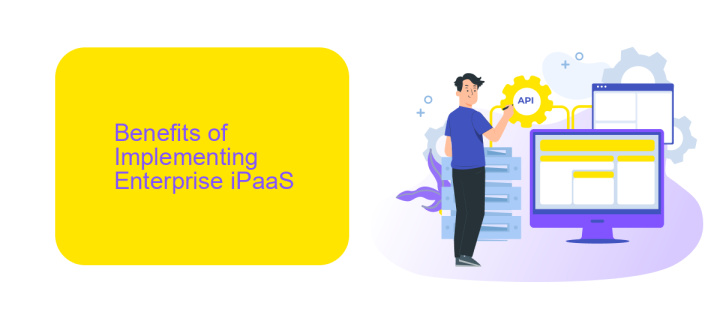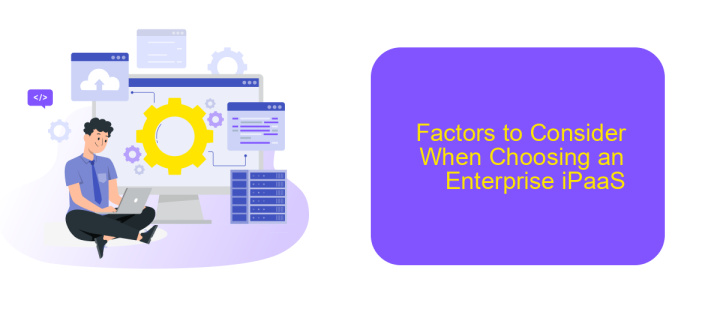Enterprise iPaaS Solutions
In today's fast-paced digital landscape, Enterprise Integration Platform as a Service (iPaaS) solutions have become essential for businesses looking to streamline their operations and enhance connectivity. By seamlessly integrating various applications and data sources, iPaaS enables organizations to achieve greater efficiency, agility, and scalability. This article explores the key benefits and features of enterprise iPaaS solutions, and how they can drive innovation and growth.
Introduction: Understanding Enterprise iPaaS
Enterprise Integration Platform as a Service (iPaaS) solutions have become indispensable for modern businesses aiming to streamline their processes and enhance interoperability. These platforms enable seamless integration between various applications, data sources, and services, thus fostering a more connected and efficient enterprise environment.
- Automated workflows
- Real-time data synchronization
- Enhanced scalability and flexibility
- Reduced operational costs
One notable example is ApiX-Drive, a service that simplifies the setup of integrations across multiple platforms. With ApiX-Drive, businesses can effortlessly connect their CRM, ERP, and other systems, ensuring that data flows smoothly and accurately. This level of integration is crucial for maintaining data consistency, improving decision-making, and ultimately driving business growth.
Benefits of Implementing Enterprise iPaaS

Implementing Enterprise iPaaS solutions offers numerous benefits, including streamlined integration processes and enhanced operational efficiency. By consolidating various applications and data sources into a single platform, businesses can reduce the complexity and cost associated with managing multiple integration tools. This results in faster deployment times, improved data accuracy, and increased agility in responding to market changes. For example, services like ApiX-Drive facilitate seamless integration by providing a user-friendly interface and pre-built connectors, enabling organizations to automate workflows without extensive coding knowledge.
Moreover, Enterprise iPaaS solutions enhance scalability and flexibility, allowing companies to easily adapt to evolving business needs. As organizations grow, they can effortlessly integrate new applications and data sources, ensuring continuous and efficient operations. Enhanced security features, such as data encryption and compliance with industry standards, further protect sensitive information, reducing the risk of data breaches. Overall, adopting an Enterprise iPaaS solution empowers businesses to optimize their integration strategies, leading to improved productivity and a competitive edge in the marketplace.
Key Features and Capabilities of an Enterprise iPaaS

Enterprise iPaaS (Integration Platform as a Service) solutions offer a wide range of features and capabilities that streamline and enhance business operations. These platforms are designed to simplify the integration of various applications, data sources, and services, ensuring seamless communication and data flow across the organization.
- Scalability: Enterprise iPaaS solutions can easily scale to accommodate growing data volumes and increasing numbers of integrations.
- Real-time Data Processing: These platforms enable real-time data processing, ensuring that businesses can make timely and informed decisions.
- Pre-built Connectors: They come with a wide range of pre-built connectors for popular applications and services, reducing the time and effort required for integration.
- Data Transformation: Enterprise iPaaS solutions offer robust data transformation capabilities, allowing data to be converted into the required formats for different systems.
- Security and Compliance: These platforms provide advanced security features and ensure compliance with industry standards and regulations.
- User-friendly Interface: Solutions like ApiX-Drive offer intuitive interfaces that make it easy for users to configure and manage integrations without extensive technical knowledge.
By leveraging the capabilities of enterprise iPaaS solutions, organizations can achieve greater efficiency, reduce operational costs, and maintain a competitive edge in their respective industries. With tools like ApiX-Drive, businesses can automate and streamline their integration processes, ensuring a smooth and efficient workflow.
Factors to Consider When Choosing an Enterprise iPaaS

When selecting an Enterprise iPaaS solution, it's crucial to evaluate several key factors to ensure it meets your organization's needs. The right iPaaS can streamline operations, enhance productivity, and support scalability.
First, consider the integration capabilities of the iPaaS. It should support a wide range of applications and systems, both on-premises and cloud-based. Look for solutions that offer pre-built connectors and easy-to-use interfaces, such as ApiX-Drive, which simplifies the process of connecting various services and automating workflows.
- Scalability: Ensure the iPaaS can grow with your business needs.
- Security: Robust security features are essential to protect sensitive data.
- Cost: Evaluate the pricing model to ensure it fits within your budget.
- Support: Reliable customer support can help resolve issues quickly.
Finally, assess the user-friendliness of the platform. A solution that is easy to implement and manage will reduce the learning curve and increase adoption rates across your organization. By considering these factors, you can select an Enterprise iPaaS that aligns with your operational goals and technical requirements.
Best Practices for Successful Enterprise iPaaS Implementation
Successful implementation of an Enterprise iPaaS (Integration Platform as a Service) requires thorough planning and a clear understanding of business needs. Start by identifying and documenting all integration requirements, including data sources, applications, and workflows. Ensure that your chosen iPaaS solution can handle the volume and complexity of your data. It's also crucial to involve key stakeholders from the beginning to gain their insights and secure their buy-in. This collaborative approach helps in aligning the iPaaS implementation with organizational goals and ensures smoother adoption.
Leverage tools like ApiX-Drive to simplify and automate your integration processes. ApiX-Drive offers a user-friendly interface and a wide range of pre-built connectors, making it easier to link various applications and systems without extensive coding. Regularly monitor and test integrations to ensure they are functioning correctly and efficiently. Establish a robust governance framework to manage and maintain your integrations, including setting up data security protocols and compliance measures. Continuous training and support for your team will further enhance the effectiveness and longevity of your iPaaS implementation.
- Automate the work of an online store or landing
- Empower through integration
- Don't spend money on programmers and integrators
- Save time by automating routine tasks
FAQ
What is Enterprise iPaaS?
How does an iPaaS solution benefit my business?
Can iPaaS handle both cloud and on-premises integrations?
What are some common use cases for iPaaS?
How easy is it to set up integrations using an iPaaS solution?
Time is the most valuable resource in today's business realities. By eliminating the routine from work processes, you will get more opportunities to implement the most daring plans and ideas. Choose – you can continue to waste time, money and nerves on inefficient solutions, or you can use ApiX-Drive, automating work processes and achieving results with minimal investment of money, effort and human resources.


